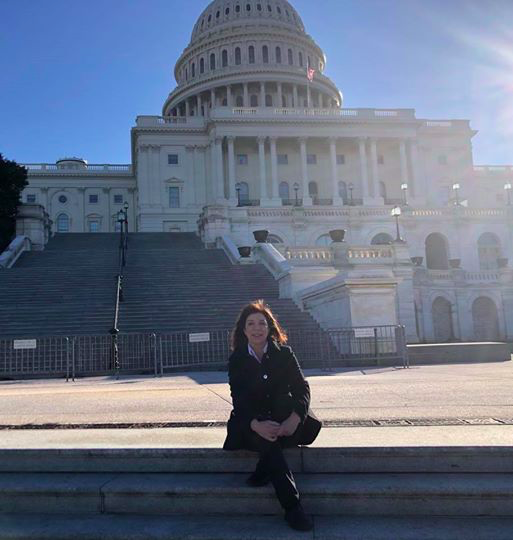
Dr. Reye on the steps of The United States Capitol
I am in Washington DC, my first trip ever to our nation’s capital. I can’t believe that I have never been to this outstanding city. I am amazed and impressed and have the joy of sharing it with my son.
I am here with a purpose. I have been asked and am honored to participate in National Cancer Prevention Day. This is a topic that hits close to home. My father was diagnosed with colon cancer at age 52 and died at age 54. My mother has suffered from breast cancer. My goal, as long as I can remember, has been to not get cancer. I know that both of my parents’ cancers were preventable and largely due to their lifestyle choices.
My goal, if I were to get cancer, is first to catch it early so that I could suffer the least amount of treatment interventions. My second goal is to find the best care possible.
I became a physician, thinking that would give me the tools I would need to learn to prevent and treat cancer for myself, my family and my patients. I was wrong. Medical school and much of residency is about the physical structure, function and disease in humans. There is virtually nothing taught about nutrition and prevent.
Who do people believe can guide them with the proper choices in order to prevent disease? The vast majority of people would say their doctor or primary care provider. I know that most do not possess the knowledge they need to properly guide patients.
Why is this important? We know that approximately 70% of cancers are preventable. This means that through knowledge, education and guidance and proper choices we likely can reduce the incidence of cancer in our country, states and communities. We know that obesity is considered a modifiable risk factor for cancer and the current projections are that 60% of the residents of most states will be obese by 2030. We know that when we look at the connection between obesity and cancer we may be on an upward trajectory. One in six male cancer deaths and one in five female cancer deaths are related to obesity with an increased risk of breast cancer, endometrial cancer, ovarian cancer, prostate and pancreatic cancer to name a few.
What do we need to do? It is time to educate the doctor. Nutrition and preventative medicine may have a bigger impact on diseases over time than repeated interventions performed on avoidable disease. It is time to have services that address prevention as a reimbursed benefit. We know in medicine that non reimbursable services are unlikely to be provided and we will continue to value a disease based intervention health delivery model.
It is time to bring prevention into the schools by providing only healthy food for the mind and body and teaching children and parents about proper nutrition. This reduces obesity, decreases disease and improves school performance. It is time to hold communities and our local government responsible for prioritizing efforts to maintain healthy water, a clean environment, health care services and education in order to grow healthy communities. It is time to rely on evidence based approaches to the prevention of cancer and cancer recurrence because without the contribution of scientific research we are destined to wander in the dark aimlessly.
Let’s shift the paradigm in medicine from cancer intervention and treatment to prevention and risk reduction.

Leave A Comment
You must be logged in to post a comment.